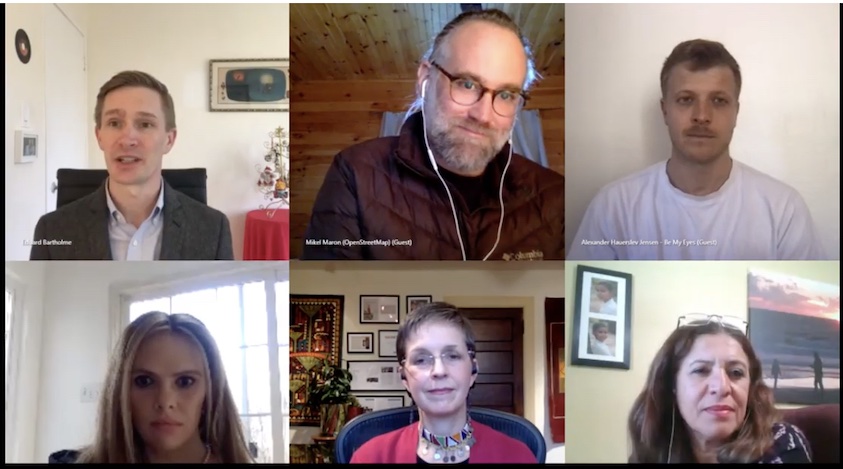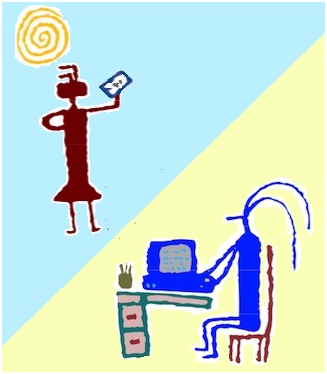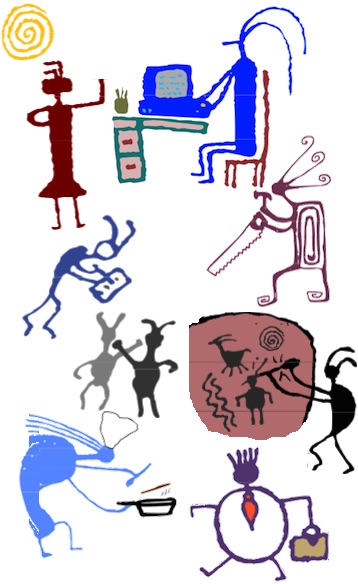
On Wednesday, December 2, 2020, the US Federal Communications Commission (FCC) hosted a webinar on “Virtual Volunteerism.” The purpose of the webinar was to illustrate how broadband allows volunteers in a variety of regions to engage in substantial, high-impact virtual volunteering activities. The webinar presented a panel of representatives from virtual volunteering initiatives – nonprofits that have programs that involve online volunteers primarily, rather than traditional programs that added an online volunteering component (a screen capture of participants is above). I was pleased to have been called on by the FCC to make recommendations about programs they could feature in this webinar, some of which are profiled in The Last Virtual Volunteering Guidebook.
The webinar featured representatives from:
- the United Nations Volunteers program, which hosts the UN’s Online Volunteering Service (which I directed from February 2001 – February 2005),
- Be My Eyes,
- Crisis Text Hotline,
- Infinite Family and
- Open Streett Map Foundation.
The webinar was facilitated by David Savolaine from the Consumer Affairs and Outreach Division, who contacted me for references for presenters, and Eduard Bartholme, FCC Associate Chief in the Consumer and Governmental Affairs Bureau.
The webinar panelists talked mostly about the specifics of how their initiatives involve online volunteers (the exact roles that volunteers undertake), how those volunteers are supported and how those volunteers are central to their initiative’s online program delivery and mission.
It’s rare that there is a presentation on virtual volunteering where audiences get to hear directly, at length, from organizations that are engaging online volunteers. Most presentations on virtual volunteering are by people like me – researchers and consultants about the practice – or by people from the corporate sector either bragging about their employees that volunteer online in a program they designed or that have launched yet another web-based platform to recruit online volunteers. There’s no better place to learn about factors for success in engaging volunteers online than by talking to the nonprofits and NGOs engaging such volunteers – which is why The Last Virtual Volunteering Guidebook quotes extensively a variety of organizations that involve online volunteers, to illustrate how the recommendations in the book are put into practice.
The panelists talked about the makeup of their online volunteers (quite diverse), the personal, substantial relationships online volunteers have with clients and each other (something I devoted an entire video to on YouTube), and what’s key to success in supporting the volunteers to ensure they are successful – keys that are detailed in The Last Virtual Volunteering Guidebook. I’ll summarize them below:
Recruitment
When asked how they recruit people to volunteer with their initiatives, all of the panelists said they don’t actively recruit – instead, volunteers find them. Be My Eyes noted that they had 10,000 people sign up to volunteer within the first 24 hours of their launch – far more than they have opportunities for. The representative from Be My Eyes noted, “The key is people having a great experience and they tell their friends about it. We haven’t spent any money on marketing on anything like that.” Infinite Family and Open Street Maps affirmed that volunteers having a great experience and telling their friends is key for not having to actively recruit volunteers.
Per the disproportionate number of roles and assignments for online volunteers versus demand that so manhy virtual volunteering initiatives report, Naoual Driouich in the United Nations Volunteers New York office said, “For the volunteers, I will say to be patient and to continue applying for opportunities, not to give up, even if the opportunity closes, even if there is a waiting list. Just continue looking for opportunities.”
It’s worth noting that in my four years of managing the Virtual Volunteering Project and the four years managing the UN’s Online Volunteering service, those programs were never marketed to people to encourage them to volunteer online – instead, we marketed exclusively to programs to host online volunteers. And, yet, there was always, always, far more people contacting me that wanted to volunteer than there were roles and tasks for them to do.
Make the experience collaborative
Mikel Maron of the Open Street Map Foundation noted a key to ensuring sustainability of a program that I would love to write an entire blog about, and it would make a great research topic to see how this works at other organizations:
I think opening up the opportunity to your volunteers to create with you and to figure out what you’re doing together is really an amazing way to build something, to build a platform. It takes some humility because you don’t know everything, but the result can be – if you can find a way of gathering together and figuring out things together its amazing, and it created more dedicated volunteers if they really have a stake, not just in what they do, but how they do it.
Amy Stokes, Infinite Family, agreed:
I think we’re all learning together, certainly we are in our organization.
Support Volunteers
Infinite Family is an international online mentoring program, which brings together adult mentors in the USA together with students in South Africa, via a special platform the organization uses for interactions. Amy Stokes of Infinite Family noted in the webinar,
One of the things that we found that is really important is (providing) ongoing support for the volunteers throughout the relationship. We have an on-call site all the time (to help with) stressful situations tech problems, whatever. Volunteers know there’s always somebody there to help with ongoing challenges.
She noted that volunteers are all using different tools to access Infinite Family’s tools and resources – they are using different browsers and different operating systems – and so the nonprofit has tried to create a platform that will work across these systems – and it doesn’t always.
The interaction between the browser, the operating system, the application, whatever your ISP is doing that day – all of a sudden, something that worked a week ago beautifully won’t work at all. Sometimes, tech companies don’t put out notes to say, ‘Oh, we’re going to do this and it might affect the rest of your system.’ And so, sometimes, a volunteer reaches out and says ‘What is going wrong?’ It might not work today, they might not be doing anything wrong. We find that it helps if we tell them upfront, at the very beginning, ‘You know, this is a tech thing. You’re probably used to everything working in your world and you can control it. But now you’re working in a lot of other worlds at the same time, and we can’t control all of those things…’ I mean, how many times do you log in at the last minute to do something and the app pops up and says, ‘Oh, no, you’ve got to change your password. Or, Oh, no, you’ve got to upgrade, please download.’ You just have to build in a kind of flexibility.
Ashley Womble of Crisis Text Hotline also talked about the importance of support to volunteers when you are asking them to use a custom online tool:
We teach as part of our training how to use our platform. We don’t expect crisis counselors and volunteers to come to us knowing how to use our platform at all. We built it and we have to train them… certainly, we can’t know whenever people are going to have Internet issues, but we do help in the beginning (with training) and that reduces a lot of the stress.
A diversity of people and experiences
Mikel Maron of the Open Street Map Foundation noted the importance of remembering that every place in the world is not the same when you are dealing with online volunteers that are in other regions, especially in other countries.
I spent a lot of time working in Kenya and it looked very different to volunteer in a place where you may also have a struggle to make ends meet day-to-day. But people (from those places) also want to contribute.
So Open Street Map has to help support those online contributors. “How do you testify what a road is in rural Kenya versus the middle of London?” He says that organizations need to consider how different people from different places communicate online.
We’re a global project and even if you all speak English… there’s just a lot of assumptions about our communications and we miscommunicate all the time…. Within Open Street Map that just means we’re constantly on our toes and learning about how we can connect to others. On the flip side, it’s amazing we get to connect with others through what we do. We learn so much about other places and other people and really build rich relationships with people on the other side of the world and around the corner.
Crisis Text Line had a unique approach:
We’re also gamefied our program a little bit. Based on the number of conversations people have, they get to a certain level, and people want to work up the ladder so they can unlock different perks, as you might in a video game. That’s worked really well for us. I know I’m personally very proud that I’m a level four, and I can’t wait to become a level fie, and I’ll be spending more time myself volunteering in the organization.
Final advice
Naoual Driouich in the United Nations Volunteers New York office had this advice for organizations that want to involve online volunteers, and I think she’s absolutely correct:
Please put yourselves in the shoes of the online volunteer when you put together the opportunity. Make sure it is complete and straight forward.
I absolutely agree. When host organizations put themselves into the shoes of volunteers, thinking, “What would I need to be able to do this assignment if I was not already a part of this organization? What would I need to be successful?” they end up instituting the support volunteers need.
It was a terrific learning experience, and if you missed it, here’s the full information about the webinar and here is the recorded webinar on YouTube. Congrats to the FCC on an excellent webinar.

As noted earlier, some of these initiatives, and all of what they noted was essential to success, are profiled or detailed in The Last Virtual Volunteering Guidebook. The book, available as an online book and in traditional print form, offers much more detailed advice on creating assignments for online volunteers, for working with online volunteers, for using the Internet to support and involve ALL volunteers, including volunteers that provide service onsite, and for ensuring success in virtual volunteering. It also talks about policies and procedures, such as how developing written agreements to be signed by both online volunteers and their host organization (page 66) can prevent problems down the road, not only regarding ownership and use of what an online volunteer create, including web sites and code, but also regarding confidentiality and privacy in using of the volunteer’s information, including images of them, regarding confidentiality regarding the organization and the information the volunteer has access to, particularly client information, regarding how the online volunteer should represent his or her association with the program online (in emails, on social media, on LinkedIn, etc.), and liability regarding malware.






